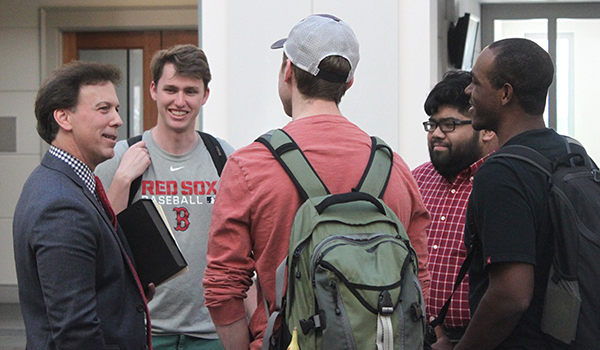 The faculty at Catholic Law is comprised of educators dedicated to teaching, scholarship, and service. They are experts in their fields and dedicated to providing a first rate legal education—incorporating lessons from multiple disciplines into their teaching.
The faculty at Catholic Law is comprised of educators dedicated to teaching, scholarship, and service. They are experts in their fields and dedicated to providing a first rate legal education—incorporating lessons from multiple disciplines into their teaching.
For Professor A.G. Harmon, that means connecting his passion for writing and literature with the law. “I began teaching when I was pursuing my doctorate in English literature. I started out teaching writing, as I have always published fiction and essays, and that translated well when I made my way into teaching legal courses. All of these disciplines have a lot in common.”
Harmon teaches a variety of courses at Catholic Law including Lawyering Skills, Advanced Legal Research and Writing, Law Journal Writing, Law Journal Editing, Law and Literature, and Jurisprudence—each course touching on his areas of expertise, written and oral argument, logic/ philosophy, and legal scholarship. Harmon shared, “I’ve taught a wide variety of courses here at CUA, both doctrinal and skills-related, and have published in a range of fields, but my particular interest is in theoretical/philosophical aspects of the law. That interest springs from the other area in which I teach and publish, English literature. After I went to law school, I got my doctorate in that field specializing in the Renaissance, Shakespeare in particular. That required a broad historical background not only in the arts, but also in law and philosophy. My dissertation examined the law as Shakespeare used it in his plays, which set me up for teaching classes in Jurisprudence (legal philosophy) and Law and Literature (legal philosophy taught through literary texts). I also have an interest in Law and Language—an interdisciplinary study that draws upon linguistics.”
Through his interdisciplinary approach to the law, Harmon finds that “Logical thought, objectivity, dedication, solid rhetorical and grammatical skills, and of course integrity” are skills paramount to being a good lawyer and advocate for clients. He continued, advising students, “If those are the goals, then the best students are those who seek to develop them.”
